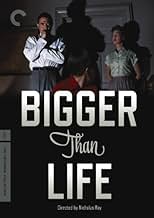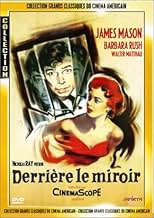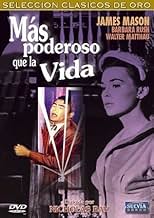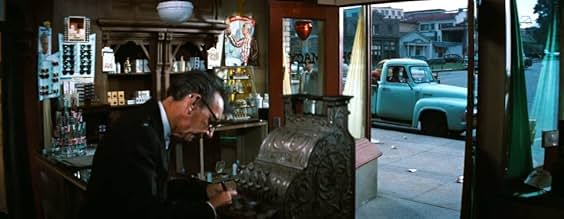AVALIAÇÃO DA IMDb
7,4/10
8,6 mil
SUA AVALIAÇÃO
Um professor gravemente doente torna-se dependente de uma droga "milagrosa" que começa a afetar sua sanidade.Um professor gravemente doente torna-se dependente de uma droga "milagrosa" que começa a afetar sua sanidade.Um professor gravemente doente torna-se dependente de uma droga "milagrosa" que começa a afetar sua sanidade.
- Direção
- Roteiristas
- Artistas
- Prêmios
- 2 indicações no total
Robert F. Simon
- Dr. Norton
- (as Robert Simon)
David Bedell
- X-Ray Doctor
- (não creditado)
Gail Bonney
- Mother at PTA Meeting
- (não creditado)
Harold Bostwick
- Gentleman
- (não creditado)
Lovyss Bradley
- Churchgoer
- (não creditado)
Ann Cameron
- Churchgoer
- (não creditado)
Mary Carroll
- Mother at PTA Meeting
- (não creditado)
Virginia Carroll
- Mrs. Jones
- (não creditado)
Mary Carver
- Saleslady
- (não creditado)
Avaliações em destaque
Ed Avery (James Mason) is a school teacher with loving wife Lou (Barbara Rush) and son Richie. Pat Wade and Wally Gibbs (Walter Matthau) are his friends fellow teachers. He starts blacking out from terrible pains. Hospital doctors diagnose him with a rare disease and give him experimental cortisone treatment. He makes a remarkable recovery and given cortisone tablets to take. His personality starts to change and he begins to abuse the pills.
The subject matter of prescription drug abuse is prescient although the madness is sometimes reminiscent of the old educational films of the dangers of marijuana. The 50's nuclear family does keep this mired in an old fashion style. Nevertheless, it is very admirable to see this issue tackled. The widescreen CinemaScope does something interesting to the interior scenes. When the walls on both sides of the room can be seen, it pulls the audience inside the rooms. The characters and their story becomes even more immediate.
The subject matter of prescription drug abuse is prescient although the madness is sometimes reminiscent of the old educational films of the dangers of marijuana. The 50's nuclear family does keep this mired in an old fashion style. Nevertheless, it is very admirable to see this issue tackled. The widescreen CinemaScope does something interesting to the interior scenes. When the walls on both sides of the room can be seen, it pulls the audience inside the rooms. The characters and their story becomes even more immediate.
Back in 1956 this must have been a very daring flick indeed. Of course it has dated and today it packs less of a punch but it still remains a very sincere film anchored by a superb James Mason performance. Walter Matthau is similarly top rate though in a smaller and less flashy role. The direction is absolutely mesmerizing and I only felt slightly uneasy about the psychiatric approach of the day and the flashing red screen reflecting Mason's mental disintegration which was so in fashion in films of the time.
Even so, it was not enough to spoil the pleasure afforded by the many good aspects in this movie that I found quite riveting and intelligent for the most part. The bit where Mason snips the phone cord is as frightening as it is memorable, to me the highpoint of a honest yet never predictable work.
Even so, it was not enough to spoil the pleasure afforded by the many good aspects in this movie that I found quite riveting and intelligent for the most part. The bit where Mason snips the phone cord is as frightening as it is memorable, to me the highpoint of a honest yet never predictable work.
Bigger than Life (1956)
Tightly made, vividly acted film about a contemporary crisis--the use and abuse of a new "miracle" drug. Watching James Mason suffer, and then make other people suffer, and then face the final bells of his life, is half the movie. He's such a uniquely subtle and powerful actor (at the same time), always filled with poise and a whiff of kindly diffidence.
In a way, this is a precursor to the recent movie idea in "Limitless," where a drug makes you "bigger than life," though this is no fantasy. The drug here is cortisone, ingested orally. It had been understood as a natural (adrenal gland) steroid hormone and was manufactured (by Merck) and on the market by around 1950. And by 1956 when this movie came out it was considered a new kind of penicillin, but rather than just be an antibiotic, it seemed to just make you stronger against all kinds of ailments, especially those that involved swelling of some kind.
Director Nicholas Ray does his usual wonders with interpersonal drama and makes this quite believable, as well as dramatic, and Joe MacDonald does his usual wonders with the camera-work. The writing, too, is crisp and believable (both Ray and Mason helped with the screenplay). In all, it's a top shelf production and a great story.
But it fails somehow to be a great film, and I think the main reason is the hook to the plot, about the wonder drug, is a little too neatly packaged, with a few scenes that are almost like public service announcements. We sort of know before we are "supposed" to know that it's going to go bad--the clues go beyond foreshadowing--and so when we find out we are right, the edge is off of the narrative. Only the very end is left hanging, though you figure, with Merck keeping an eye on things, that events really can't go too wrong. According to Wikipedia, the American response at the time was shock and the movie did poorly (I guess because it looked like an attack on the nuclear family, such was the 1950s).
But the critics loved it then and like it now. A movie this well made is still a thrill to watch for all the small things--Walter Matthau in a caricatured side role as the good Uncle, the psychological effects as manifest in Mason, and even the glimpse into the attitude toward medicine at the time. I don't think it's a typical reaction to cortisone, however (from what I've read)--this is a particular case where some inherent manic-depression is triggered, and exaggerated. It would be interesting to see this re-calibrated and filmed again in modern times, but with the subtlety here, the destruction of an ordinary family without shameless excess.
Tightly made, vividly acted film about a contemporary crisis--the use and abuse of a new "miracle" drug. Watching James Mason suffer, and then make other people suffer, and then face the final bells of his life, is half the movie. He's such a uniquely subtle and powerful actor (at the same time), always filled with poise and a whiff of kindly diffidence.
In a way, this is a precursor to the recent movie idea in "Limitless," where a drug makes you "bigger than life," though this is no fantasy. The drug here is cortisone, ingested orally. It had been understood as a natural (adrenal gland) steroid hormone and was manufactured (by Merck) and on the market by around 1950. And by 1956 when this movie came out it was considered a new kind of penicillin, but rather than just be an antibiotic, it seemed to just make you stronger against all kinds of ailments, especially those that involved swelling of some kind.
Director Nicholas Ray does his usual wonders with interpersonal drama and makes this quite believable, as well as dramatic, and Joe MacDonald does his usual wonders with the camera-work. The writing, too, is crisp and believable (both Ray and Mason helped with the screenplay). In all, it's a top shelf production and a great story.
But it fails somehow to be a great film, and I think the main reason is the hook to the plot, about the wonder drug, is a little too neatly packaged, with a few scenes that are almost like public service announcements. We sort of know before we are "supposed" to know that it's going to go bad--the clues go beyond foreshadowing--and so when we find out we are right, the edge is off of the narrative. Only the very end is left hanging, though you figure, with Merck keeping an eye on things, that events really can't go too wrong. According to Wikipedia, the American response at the time was shock and the movie did poorly (I guess because it looked like an attack on the nuclear family, such was the 1950s).
But the critics loved it then and like it now. A movie this well made is still a thrill to watch for all the small things--Walter Matthau in a caricatured side role as the good Uncle, the psychological effects as manifest in Mason, and even the glimpse into the attitude toward medicine at the time. I don't think it's a typical reaction to cortisone, however (from what I've read)--this is a particular case where some inherent manic-depression is triggered, and exaggerated. It would be interesting to see this re-calibrated and filmed again in modern times, but with the subtlety here, the destruction of an ordinary family without shameless excess.
This is an excellent movie. I saw it once, and I never wish to see it again. I grew up in a household like this, only there was never a solution to my father's mania, depression, and incredible anger.
About all I can say about Mr Mason's performance, and that of Ms Rush, is that they could have been my parents, and I could have been that kid. It never got to the point where I was offered up like Isaac, but the rest of it was right, right down to the speech where the father condemns all children because they're ignorant. I'd heard that one. His wife was helpless; they all are.
I do not know where the screenwriters got their dialog, but I hope they didn't learn it the way I did. As it happened, I was terrified and transfixed while watching it, only calming down after the father realized that something was wrong, and vowed to correct it, and there was a means of correcting it.
When the movie was over--I don't know if I watched it in the theater or on TV--I had to go home, where there was still rage, and no solution to it. I would have been nine years old.
There was a time that I wanted my parents to see that movie, in the hope that they'd realize that this was how they acted, and stop it.
It never happened. They were divorced years later. My father was angry and crazy right up to the day he died three years ago. My mother, in her nursing home in Cleveland, maintains that I must be making it all up.
M Kinsler
About all I can say about Mr Mason's performance, and that of Ms Rush, is that they could have been my parents, and I could have been that kid. It never got to the point where I was offered up like Isaac, but the rest of it was right, right down to the speech where the father condemns all children because they're ignorant. I'd heard that one. His wife was helpless; they all are.
I do not know where the screenwriters got their dialog, but I hope they didn't learn it the way I did. As it happened, I was terrified and transfixed while watching it, only calming down after the father realized that something was wrong, and vowed to correct it, and there was a means of correcting it.
When the movie was over--I don't know if I watched it in the theater or on TV--I had to go home, where there was still rage, and no solution to it. I would have been nine years old.
There was a time that I wanted my parents to see that movie, in the hope that they'd realize that this was how they acted, and stop it.
It never happened. They were divorced years later. My father was angry and crazy right up to the day he died three years ago. My mother, in her nursing home in Cleveland, maintains that I must be making it all up.
M Kinsler
James Mason becomes "Bigger than Life" in this 1956 Nicholas Ray film that also stars Barbara Rush and Walter Matthau. Mason plays Ed Avery, a schoolteacher who also is a part-time cab dispatcher. He is suffering from severe spasms that are getting worse.
Ed learns that he has a terminal illness that perhaps can be cured with a steroid, cortisone. He is helped, but he also begins to suffer from mood swings and depression and, as he takes more and more, veers completely out of control. Barbara Rush plays his suffering wife, and Walter Matthau is a family friend and coworker.
I actually had a family member who went into profound depressions because of continuing to take black market cortisone, so this film resonated with me. Mason, who produced the film, is terrifying. Barbara Rush is very good, though her character puts up with an awful lot before she makes a move. Matthau is good in a supporting role, but roles showcasing his true strengths as an actor were a few years away.
This is much more than a cautionary tale about steroids, which need to be taken and tapered off very carefully. In his cortisone-induced mindset, Ed Avery spouts off on the problems in society, very unusual in the repressed '50s. His ideas are a tad over the top, but there's a good kernel in them. Ray always did well with a rebellious mindset.
Ed learns that he has a terminal illness that perhaps can be cured with a steroid, cortisone. He is helped, but he also begins to suffer from mood swings and depression and, as he takes more and more, veers completely out of control. Barbara Rush plays his suffering wife, and Walter Matthau is a family friend and coworker.
I actually had a family member who went into profound depressions because of continuing to take black market cortisone, so this film resonated with me. Mason, who produced the film, is terrifying. Barbara Rush is very good, though her character puts up with an awful lot before she makes a move. Matthau is good in a supporting role, but roles showcasing his true strengths as an actor were a few years away.
This is much more than a cautionary tale about steroids, which need to be taken and tapered off very carefully. In his cortisone-induced mindset, Ed Avery spouts off on the problems in society, very unusual in the repressed '50s. His ideas are a tad over the top, but there's a good kernel in them. Ray always did well with a rebellious mindset.
Você sabia?
- CuriosidadesThe main manufacturers of cortisone at the time, Merck in the US and Glaxo in the UK, were worried about the impact of this film on the public and their willingness to take the drug if prescribed by their physician. However, by the time of this film's release, newer and better formulations of the drug, along with greater knowledge of its uses and limitations had reduced (but not eliminated) the side-effects experienced by Ed in this film.
- Erros de gravaçãoWhen Ed has a barium X-ray, the image of the swallowed fluid is anatomically inaccurate. The fluid falls straight down to an extremely large "stomach" in his groin area.
Principais escolhas
Faça login para avaliar e ver a lista de recomendações personalizadas
- How long is Bigger Than Life?Fornecido pela Alexa
Detalhes
- Data de lançamento
- País de origem
- Idiomas
- Também conhecido como
- Bigger Than Life
- Locações de filme
- Empresa de produção
- Consulte mais créditos da empresa na IMDbPro
Bilheteria
- Orçamento
- US$ 1.000.000 (estimativa)
- Tempo de duração
- 1 h 35 min(95 min)
- Cor
- Proporção
- 2.55 : 1
Contribua para esta página
Sugerir uma alteração ou adicionar conteúdo ausente































